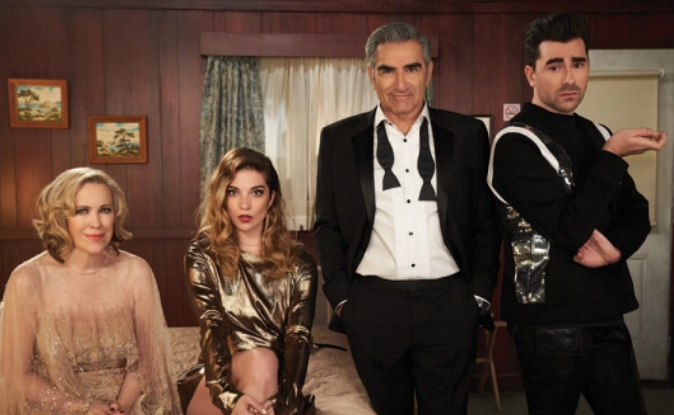The Roses of Rideau Hall is the Reality Show the World Needs
The Canadian comedy that just swept the Emmys can’t possibly stop now. Here’s a suggestion.

Lisa Van Dusen/For The Hill Times
September 24, 2020
As much of the world takes up a new form of foxhole God-bargaining in which the divine intervention deliverable is ending the reality show in the White House, a new Canadian offering could take its place.
Amid a cascade of apocalyptic news about the COVID-19 pandemic, U.S. President Donald Trump’s rolling, broad-daylight heist of American democracy and a series of celebrity deaths so relentless it’s beginning to look like an Agatha Christie dinner theatre mystery, Schitt’s Creek, the subversively humanist six-season CBC sitcom masterminded by Dan Levy and his father, Eugene, swept the comedy category of the socially-isolated, remotely staged Emmys on Sept. 20.
The fact that Schitt’s Creek—a sort of Green Acres-meets-Northern Exposure-meets-nothing-you’ve-
In between, legendary Second City alumnae Catherine O’Hara as the loopy, sublimely unself-aware former soap opera star Moira Rose and Eugene Levy as her recovering billionaire husband, Johnny, vaguely preside over the lives of their spoiled son and daughter David and Alexis, played by Dan Levy and Annie Murphy.
As with the best classic sitcoms, much of the comedy comes from the sit, in this case the head-spinning change of circumstance for the Roses, who’ve gone from multiple residences in all the world’s wretched-excess datelines to adjoining rooms at the low-occupancy Rosebud Motel in Schitt’s Creek, a town Johnny once bought as a joke.
Anyone who grew up in a small town knows that they contain no shortage of melodrama as well incredible examples of generosity and solidarity. Schitt’s Creek, through the adaptation arcs of the Roses and the way in which the writers have taken small town stock characters—including waitress Twyla, played by sibling Sarah Levy—stripped them of all their clichés and rebuilt them as fully original humans, becomes a show about, as Dan Levy said Sunday night, the transformational power of love and acceptance. In the process, it only gets funnier and funnier.
At a time when so much of what we scroll through, over and over again, looking for something to watch that doesn’t feel like masochistic, anti-human propaganda—Schitt’s Creek uses its platform to unabashedly peddle values that honour the species. That includes through the good kind of normalization—not the kind that makes rage and racism and homophobia and corruption seem normal, but the kind that presents identity as a product of character, not label, that values love as any deeper variation of friendship and that defines family as any group of people who love each other.
To make that funny without ever veering too far into mawkishness is almost as great a feat as making that funny without ever veering too far into snark. From someone who has veered too far into snark more often than she should’ve because a punchline happened to be low-hanging fruit, deep respect.
One of the sweetest revelations of Schitt’s Creek, along with the perpetual revelation of O’Hara’s virtuosity in making a superannuated, wig-addicted diva lovable, is Levy senior as a distinguished patriarch and sort of Canadian elder statesman of comedy.
Maybe when Governor General Julie Payette’s term is up in 2022, the questions of both succession and the demand for more of Schitt’s Creek could be solved by appointing Eugene Levy as Canada’s first Jewish governor general. Schitt’s Creek II, The Roses of Rideau Hall, would be brilliant.
Lisa Van Dusen is associate editor of Policy Magazine and a columnist for The Hill Times. She was Washington bureau chief for Sun Media, international writer for Peter Jennings at ABC News, and an editor at AP in New York and UPI in Washington.
